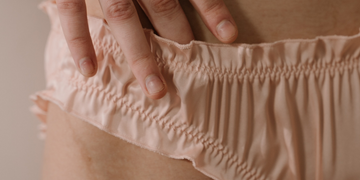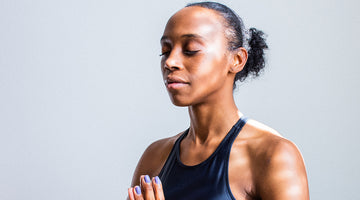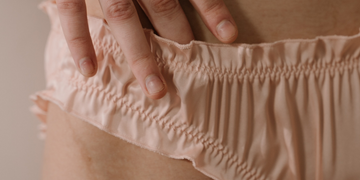Why do I get yeast infections around my period?

Yeast infections are commonly associated with your period because changes in hormonal levels can cause a change in your vaginal environment. While it’s actually very common for yeast infections to occur the week before your period begins, is it safe to treat the issue while you’re on your period? We’ll go over how to recognize a yeast infection, why your menstrual cycle can increase your risk of yeast infection, and how to treat your yeast infection during your period.
How do I know I have a vaginal yeast infection?
You can get a yeast infection when the yeast that’s found naturally in your vagina grows excessively. This growth may be due to a variety of factors. Candida albicans, a type of yeast, is the most common cause of yeast infection.
Are yeast infections an STD?
Yeast infections have some overlapping symptoms with STIs and other vaginal infections, such as BV. They aren’t classified as STIs because they aren’t usually sexually transmitted. It is possible to get a yeast infection after sex, but there’s often another cause.
What are symptoms of a yeast infection?
Yeast infection symptoms can be nonexistent, mild, or severe, and can include:
Test, Treat, and Prevent Yeast Infections
- Vaginal discomfort and itchiness
- Pain or discomfort during sex or when you pee
- Thick, white discharge that looks like cottage cheese
Some vaginal discharge is normal. However, discharge can also be a sign of problems such as a yeast infection or other vaginal infection. Pay attention to any change in the amount, color, or smell of the vaginal discharge if it lasts more than a few days.
If you’re experiencing these symptoms, you can take a Winx Health (formerly known as Stix) Vaginal pH Test for Yeast Infections to help determine the cause of your discomfort. If your test results indicate that you may have a yeast infection, you can treat your yeast infection from the comfort of your home with our Yeast Infection Test & Treat Combo.
Why do I get yeast infections around my period?
It’s unclear whether your menstrual cycle can be considered a cause for a yeast infection. However, your cycle’s natural hormonal fluctuation might increase your chances of getting a yeast infection. Yeast and bacteria naturally exist in your vagina, striking a balance. When this balance shifts, you might get an infection.
You may be more susceptible to yeast infections before, during, or after your period because of hormonal fluctuation. Sometimes, when estrogen levels go back down during menstruation, the yeast infection will clear up. Since hormonal balance can affect the likelihood of getting a yeast infection, it’s less likely — though still possible — to get a yeast infection before puberty or after menopause. Risk factors that can lead to a yeast infection include:
- Pregnancy
- Diabetes and blood sugar levels that are poorly managed
- Higher concentrations of estrogen (some hormonal birth controls)
- Weakened immune system
- Recent use of antibiotics
- Douching and vaginal sprays (anything scented)
How can I treat a yeast infection if I’m on my period?
Menstruation can sometimes clear up the yeast infection because it raises vaginal pH. Higher vaginal pH can decrease the number of yeast cells. Anti-fungal medication takes many forms, including using a cream or suppository that’s applied directly, or you can take a pill orally. You can usually find these medications over-the-counter. You can treat your yeast infection from home with Winx Health 3-Day Yeast Infection Treatment, which includes 3 vaginal suppositories to treat the infection and external vulvar cream to relieve itching and irritation.yeast-infection-complete-combo
You can choose to adjust your use of sanitary pads, tampons, or menstrual cups while treating a yeast infection. Pads and tampons may not be the underlying cause of your yeast infection, but they can trap extra moisture, contributing to an environment that helps yeast thrive. You can decrease the possibility of a menstrual cup causing infection if you wash your hands before handling the menstrual cup and make sure to sanitize the cup before and after use. It may also be beneficial to change your sanitary product more frequently when you have a yeast infection during your menstrual period.
It’s not uncommon for yeast infections to be more uncomfortable and harder to manage during your period.
How can I prevent yeast infections?
Yeast infections aren’t entirely avoidable, but you may reduce your risk of getting one by following certain lifestyle practices. Only use antibiotics when necessary and focus on your general wellbeing. It’s not clear whether changes to your diet can prevent yeast infection, but having a diet that’s low in sugar and processed foods can have other health benefits. Getting enough sleep and staying physically active can also reduce the risk of infection. vaginal-health-probiotic
You can also help prevent yeast infections by following good hygiene practices like:
- Use mild, unscented soap when cleaning your vulva
- Wipe front to back after using the toilet
- Change sanitary products frequently while menstruating
- Avoid tight-fitting clothing that holds in warmth and moisture, particularly in the pelvic area
- Change out of wet clothing as soon as possible
- Taking probiotics to promote healthy vaginal microbiome
When to see a health care professional about yeast infections
If you have recurrent yeast infections, talk with your primary care provider about your symptoms. There could be an underlying cause such as diabetes or a yeast strain that’s resistant to treatment. Other conditions, including bacterial vaginosis and some sexually transmitted infections, have overlapping symptoms, so it may be beneficial to see your doctor for an accurate diagnosis and to prevent further complications.
It’s recommended to contact your primary care provider if over-the-counter treatment isn’t helping or if you have recurring yeast infections that are resistant to treatment.
Keep Reading

Yeast infection myths
Aug 13

How stress affects your period and ovulation
Oct 15

How do yeast infections affect sex?
Sep 19












